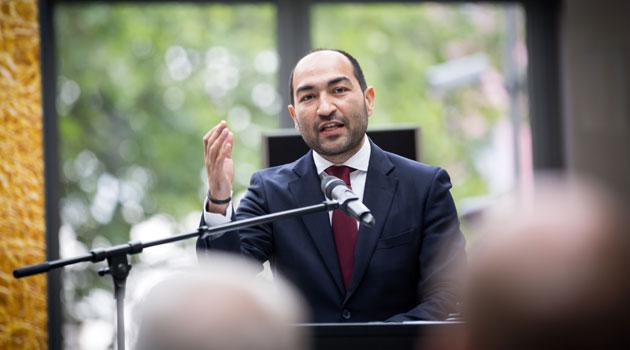Željko Jovanović: Opre Roma! Tired of being let down, Roma are now standing up for themselves

When EU leaders use the values of human rights to justify their decisions, the blatant discrimination faced by Roma across Europe puts their words to the test.
As the EU’s High Representative Josep Borell has made clear, the difference between the supportive message of “Slava Ukraini!” [Glory to Ukraine] and a Leopard tank is that the former is free, while the latter costs €10 million.
We must also question how the values-loaded narrative of human rights, equality, and democracy can be credible if the plight of Europe’s largest minority is one of deprivation.
According to recent data from the Fundamental Rights Agency (FRA), the situation remains unchanged for Roma minorities and Travellers and has even worsened in some countries, with, for example, 62% of such children living in severe deprivation.
Why do many European Roma still lead a life closer to that of those in the poorest regions in the Global South than their fellow EU citizens?
Treatment of Roma not a priority except in words
Instead of merely bemoaning the lack of government support, Roma have decided to stand up for themselves and prove their worth by fighting for Ukraine in the war and helping refugees fleeing the conflict.
Several Roma are determined to be defined as soldiers who fight for their country and not as victims of racism. One Ukrainian Roma soldier, Viktor Ilchuk, even received a medal of bravery from President Volodymyr Zelenskyy for his efforts.
Even knowing that their communities faced discrimination, were often at the brunt of pogrom attacks in Odesa, and experience violence by the far-right, these soldiers have shown true moral courage and heroism.
It is one thing to fight for your country when you know you are treated equally as your compatriots; it is another thing entirely when you are not.
Even before the Russian invasion, the situation of Roma was not a priority except in words. As it stands, the Roma situation is one of the biggest cases of inequality on the continent and must be addressed.
Yet, despite fighting daily discrimination, the 12-million-strong Roma community in Europe marches forward on World Roma Day (8 April) each year with a call for “Opre Roma!” (“Stand Up, Roma!”)
“Stand up, Roma!” A symbol of self-reliance
Born during the Cold War at the First World Romani Congress on 8 April 1971, this motto means “Stand Up, Roma!” in the Romani language.
Accompanied by the Romani flag and Romani anthem, it has become not only a cultural symbol of Roma identity and non-militarised struggle. It is also a symbol of transnational unity.
Today’s realpolitik means that we Roma are our own biggest hope, with very few friends whose actions match their words. .
The original commentary by Željko Jovanović was first published in English on Euronews.com.
Željko Jovanović is the director of the Open Society Roma Initiatives Office, which supports Romani people making their voices heard and influencing the creation of different strategies.
Like those who gathered in 1971 to proclaim “Opre Roma!” as a symbol of self-definition and self-reliance, this motto is more relevant today than ever. The message of self-reliance has become a key foundation for our community.
Like those who gathered in 1971 to proclaim “Opre Roma” as a symbol of self-definition and self-reliance, this motto is more relevant today than ever. The message of self-reliance has become a key foundation for our community.
First, Roma activists are helping the Ukrainian Roma refugees in Romania, Hungary, Slovakia, Czechia, Poland and Germany.
When they are not being treated fairly, or not receiving help in getting a translator or aid for their other administrative challenges, their brothers and sisters of Romani origin are there to provide help.
Milestones in human rights protection and art and culture, all thanks to Roma
Second, in the midst of the energy crisis, the activists of Opre Roma Serbia fought hard for the community in Niš, who had their electricity cut off just as winter began.
Their campaign was an immense symbolic message for how the most vulnerable in Serbia should be treated during the energy crisis.
Third, Dr Ismael Cortes, a Member of the Spanish parliament and a well-known Roma advocate, successfully accomplished his initiative for legislation that enacts a prison sentence of one to four years for promoting or inciting hatred or discrimination against Roma.
And fourth, the very best of Roma arts and culture was represented in the Venice Biennale 2022 by having not one but two pavilions.
This historical milestone was made possible by Małgorzata Mirga-Tas, an artist of Romani origin who represented Poland, and the European Roma Institute for Arts and Culture, which curated the Roma Pavilion.
Our values and lives are at stake
These and many more examples across Europe show how much the Roma accomplished only in the last year, often without help and despite the discrimination faced by the wider society.
Roma soldiers, advocates, artists, athletes, and entrepreneurs have been determined to break down the walls erected to limit how far they can go and what they can accomplish.
They have shown that “Opre Roma!” can’t wait for government attention and support. We march forward because we have to. After all, our values and lives are at stake.
However, that doesn’t exonerate the EU or the governments from the promises made to the largest minority in Europe.
Yes, we are joining forces to support our communities, but to create a fairer and equal Europe, our leaders must share more than mere words. They must act to lift up the underprivileged and the under-represented.
Opre Roma!
The original commentary by Željko Jovanović was first published in English on Euronews.com.
Željko Jovanović is the director of the Open Society Roma Initiatives Office, which supports Romani people making their voices heard and influencing the creation of different strategies.